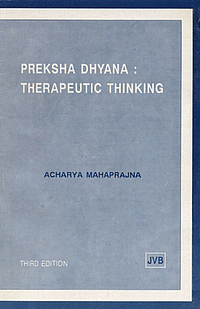 | About: |
| In publishing this booklet, it is hoped to bring to the reader, in simple language, some of the truths, already known to the ancient philosophies, and now known to modern science.
Age of Tension
In this age of techonology, industrialisation and over-urbanisation, we are constantly subjected to tremendous stresses and tensions. These, in turn, produce psychosomatic diseases like hypertension, insommia and various types of heart diseases. In desperation, people take to drinking and dangerous drugs which give temporary relief, but create more serious problems. The remedy does not lie in drugs of fantasy, but in the process of catharsis and development of the inherent powers.
Philosophy teaches us to realise that our existence is functioning in duality, i.e. there is a spiritual self within a physical ^body. Science is also proving that life's processes for man lie almost wholly within himself and are amenble to control. The control has to be exercised by the power of the spiritual self, and that inherent potency can be developed by knowing how to live properly, which includes eating, drinking and breathing properly as well as thinking properly.
What is Preksā Dhyāna?
Preksā Dhyāna is a technique of meditation for attitudinal change, behavioural modification and integrated development of personality. It is based on the wisdom of ancient philosophy and has been formulated in terms of modern scientific concepts. We hope that the synthesis of the ancient wisdom and the modern scientific knowledge will help us in achieving the blissful aim of establishing amity, peace and happiness in the world by eradicating the bestial urges such as cruelty, retaliation and hate.
The different methods of preksā (i.e. perception) include Śvāsa- preksā (perception of breathing), Śarīra-Preksā (perception of body), Chaitanya-kendra-preksā (Perception of psychic centres), etc. All these are methods of ultimate transformation in inner consciousness. Here, there is no need to sermonize for adopting virtues and giving up evils. When one starts practising perception, one experiences himself that one is changing, that anger and fear are pacifying, that one is getting transformed into a righteous person.
Our series of "Science of Living" includes tracts on various facets of Preksā-dhyāna.
In the tract No. IX we had discussed a technique of meditation in which the conscious mind is encouraged to engage itself in a "thinking process", i.e. contemplation. In the appendix of the same tract, instructions for some value- oriented exercises for acquiring virtues with high moral and human values were given in a tabular form. It was felt that full justice was not done to this very valuable technique. It was, therefore, decided to publish this tract giving full details of the exercises.
Today, with an explosion of terrorism, need of promoting social health is greater than ever before. It has now been realised that repressive legislative measures fail to reform the parochial fanaticism of individuals or their groups. Nor do social pressures succeed in reducing the inherent greediness of man. Individual reform is the only way to enhance the possibilities of a healthy society. The aim of preksā system of meditation is to eradicate evil from the way of life, behaviour and attitude of individuals. Antisocial negative attitude is a malady which afflicts the individual and destroys the society. The only therapy which can successfully treat this malady is psychic therapy.Therapeutic thinking is a practicable application and psychic therapy. Instructions for the acquisition of more than 20 virtues which are very much desirable for personal as well as social health are given in an easy-to-practise form.
| |
| Author: | Acharya Mahaprajna |
| Publisher: | Jain Vishwa Bharati, Ladnun, India |
| Editor: | Muni Mahendra Kumar |
| Translators: | Muni Mahendra Kumar, Jethalal S. Zaveri |
| Edition: | Third Edition, 1995 |
| Read online: | |
| Bookshop: | Preksha Dhyana: Therapeutic Thinking |
| Pages: | 46 |
| Dimensions: | 14.10 x 21.50 x 0.30 cm (W x H x D) |
| Weight: | 60 g |